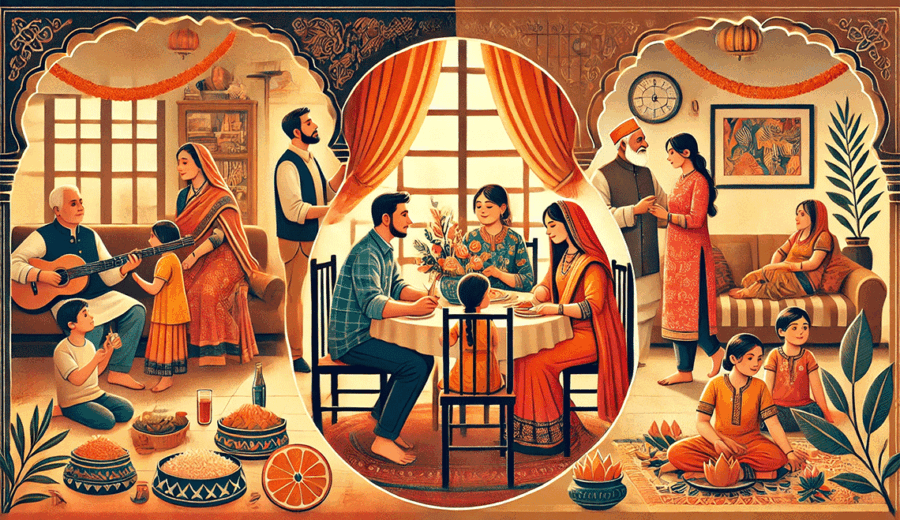
The Role of Extended Family in South Asian Relationships
The Role of Extended Family in South Asian Relationships
In South Asian cultures, the extended family holds a central place, significantly influencing relationships and married life. The joint family system is a longstanding tradition that fosters unity and cultural continuity, but it also brings unique challenges, particularly for couples striving to balance family involvement with personal boundaries.
The Joint Family System and Its Impact on Married Life
The joint family system, where multiple generations live under one roof, is a hallmark of South Asian culture. This arrangement creates a tightly-knit environment that supports emotional, financial, and social needs.
- Benefits of the Joint Family System:
- Emotional Support: Couples benefit from the wisdom and guidance of elders during challenging times.
- Shared Responsibilities: Household duties and child-rearing are often divided among family members, reducing the burden on couples.
- Cultural Continuity: Living with extended family preserves traditions, languages, and values.
- Financial Stability: Joint incomes and shared expenses provide a safety net for family members.
- Challenges of the Joint Family System:
- Lack of Privacy: Couples may struggle to find personal space within a crowded household.
- Decision-Making Conflicts: Clashing opinions on lifestyle choices, parenting, or finances can lead to tension.
- Gender Roles: Traditional expectations often place a heavier burden on women to manage household duties and family relationships.
The joint family system offers a sense of belonging and security but requires careful navigation to avoid conflicts and maintain harmony.
Pros and Cons of Extended Family Involvement
Extended families play an active role in the lives of South Asian couples, often shaping their experiences in profound ways.
- Pros of Extended Family Involvement:
- Support Network: Grandparents and relatives provide invaluable help, especially during major life events such as childbirth or health crises.
- Stronger Family Bonds: Frequent interactions foster closeness and mutual respect among family members.
- Guidance and Wisdom: Elders bring life experience and cultural knowledge that enrich family dynamics.
- Cons of Extended Family Involvement:
- Interference in Marital Decisions: Overinvolvement can lead to disputes or feelings of resentment in the couple.
- Expectations and Pressure: Couples may feel obligated to meet family standards, sacrificing their personal preferences.
- Generational Gaps: Differing views on modern values and traditional norms can create friction.
While extended family involvement can enrich a couple’s life, excessive interference may strain relationships and hinder personal growth.
Managing Boundaries and Fostering Healthy In-Law Relationships
Striking a balance between extended family involvement and a couple’s independence is essential for maintaining healthy relationships.
- Establishing Boundaries:
- Clear Communication: Couples should discuss and agree on boundaries regarding family involvement before conflicts arise.
- Respectful Assertion: Politely but firmly communicating needs helps set limits without causing offense.
- Time Management: Allocating specific times for family interactions and personal space ensures a healthy balance.
- Building Positive In-Law Relationships:
- Mutual Respect: Recognizing the contributions and perspectives of in-laws fosters a supportive environment.
- Inclusive Approach: Involving in-laws in celebrations and decision-making builds trust and unity.
- Conflict Resolution: Addressing misunderstandings early through open conversations prevents long-term resentment.
- Navigating Cultural Expectations:
- Adaptation and Compromise: Couples may need to adapt to family traditions while gently introducing modern practices.
- Seeking Mediation: When conflicts arise, neutral third parties like counsellors or elders can help bridge gaps.
By fostering mutual respect and understanding, couples can build harmonious relationships with their extended families, enhancing their married life.





Leave a Reply